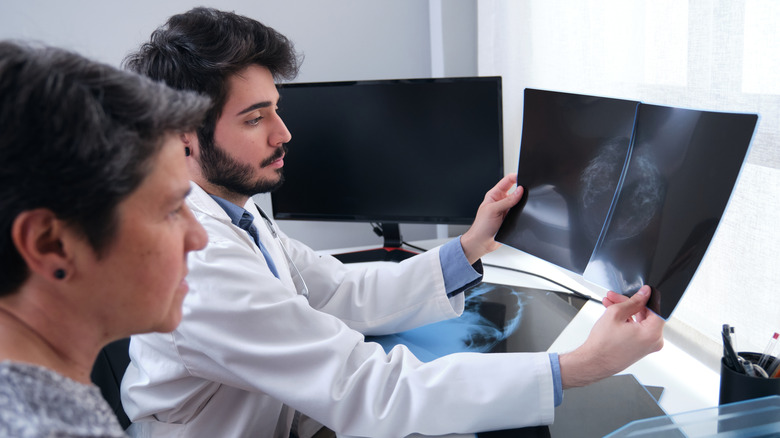An Oncologist On What To Expect After Being Diagnosed With Breast Cancer
Approximately 264,000 women and 2,400 men are diagnosed with breast cancer annually across the country, according to data from the U.S. Centers for Disease Control and Prevention (CDC). However, Dr. Ashley Pariser, a breast medical oncologist at The Ohio State University Comprehensive Cancer Center -Arthur G. James Cancer Hospital and Richard J. Solove Research Institute, explains that every breast cancer case is different.
"Breast cancer is a heterogeneous disease meaning that no two breast cancers are the same," Dr. Pariser tells Health Digest in an exclusive interview. "Additionally, breast cancer is typically treated by a multidisciplinary team of specialists. This may include a breast surgeon, medical oncologist, radiation oncologist, and plastic surgeon," she states.
After being diagnosed with breast cancer, Dr. Pariser explains that patients can expect to attend a series of different appointments with different specialists. "It is common for someone with a new diagnosis of breast cancer to anticipate multiple appointments," she states. "Sometimes additional testing such as imaging or biopsies may be needed before a treatment plan can be developed."
Asking the right questions
After receiving an official diagnosis, Dr. Pariser tells Health Digest that it's important for patients to ask a series of direct questions regarding cancer type, stage, treatment plans, and more. Such questions include, what type of breast cancer do I have? Is my breast cancer Her-2 positive? Is additional testing or imaging recommended for me? What treatments are considered standard of care for me? What treatment do you recommend for me? Are there any clinical trials that would be a good option for me?
"For most patients, initial treatment is recommended within 8 weeks of diagnosis," says Dr. Pariser. "It is important to ask your doctor when they would recommend starting treatment for you."
Dr. Pariser also encourages patients to seek a second medical opinion if they so desire. "Second opinions are a great option for understanding your cancer and treatment options," she states. "For most patients, a second opinion can be safely pursued before treatment starts."
Concluding the interview, Dr. Pariser explains that patients can expect to feel a variety of emotions throughout the diagnosis and treatment process. Therefore, having a support system in place is key. "A new diagnosis of breast cancer can be scary and feel overwhelming," she says. "Bringing a trusted friend(s) or family member(s) to appointments to be an extra set of ears and help ask questions can be very helpful."


